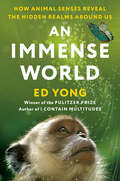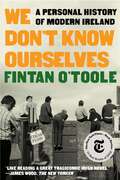Résultats de recherche de titre
Articles 1 à 3 sur 3

An Immense World: How Animal Senses Reveal the Hidden Realms Around Us
Par Ed Yong. 2022
DAISY audio (CD), DAISY audio (Téléchargement direct), DAISY audio (Zip)
Sciences et technologies, Animaux et faune
Audio avec voix humaine
Every kind of animal, including humans, is enclosed within its own unique sensory bubble, perceiving but a tiny sliver of…
our immense world. Pulitzer Prize–winning science journalist Ed Yong takes us on “a thrilling tour of nonhuman perception” (The New York Times), allowing us to experience the skeins of scent, waves of electromagnetism, and pulses of pressure that other animals perceive. “One of this year’s finest works of narrative nonfiction . . . Yong’s reporting is layered, seasoned with vivid scenes from laboratories and in the field, interviews with researchers across a spectrum of disciplines.”—Oprah Daily “A dazzling ride through the sensory world of astoundingly sophisticated creatures.”—The Wall Street Journal The Earth teems with sights and textures, sounds and vibrations, smells and tastes, electric and magnetic fields. In An Immense World, Ed Yong coaxes us beyond the confines of our own senses to encounter beetles that are drawn to fires, turtles that can track the Earth’s magnetic fields, fish that fill rivers with electrical messages, and even humans who wield sonar like bats. We discover that a crocodile’s scaly face is as sensitive as a lover’s fingertips, that the eyes of a giant squid evolved to see sparkling whales, that plants thrum with the inaudible songs of courting bugs, and that even simple scallops have complex vision. We learn what bees see in flowers, what songbirds hear in their tunes, and what dogs smell on the street. We listen to stories of pivotal discoveries in the field, while looking ahead at the many mysteries that remain unsolved. Funny, rigorous, and suffused with the joy of discovery, An Immense World takes us on what Marcel Proust called “the only true voyage . . . not to visit strange lands, but to possess other eyes.”
An Immense World: How Animal Senses Reveal the Hidden Realms Around Us
Par Ed Yong. 2022
Braille (abrégé), Braille électronique (abrégé), DAISY Audio (CD), DAISY Audio (Téléchargement Direct), DAISY Audio (Zip), DAISY texte (Téléchargement direct), DAISY texte (Zip), Word (Zip), ePub (Zip)
Animaux et faune, Sciences et technologies
Audio avec voix de synthèse, Braille automatisé
Enter a new dimension—the world as it is truly perceived by other animals—from the Pulitzer Prize-winning, New York Times bestselling…
author of I Contain Multitudes.&“A stunning achievement, steeped in science but suffused with magic.&”—Siddhartha Mukherjee, author of The GeneThe Earth teems with sights and textures, sounds and vibrations, smells and tastes, electric and magnetic fields. But every kind of animal, including humans, is enclosed within its own unique sensory bubble, perceiving but a tiny sliver of our immense world. In An Immense World, author and Pulitzer Prize–winning science journalist Ed Yong coaxes us beyond the confines of our own senses, allowing us to perceive the skeins of scent, waves of electromagnetism, and pulses of pressure that surround us. We encounter beetles that are drawn to fires, turtles that can track the Earth&’s magnetic fields, fish that fill rivers with electrical messages, and even humans who wield sonar like bats. We discover that a crocodile&’s scaly face is as sensitive as a lover&’s fingertips, that the eyes of a giant squid evolved to see sparkling whales, that plants thrum with the inaudible songs of courting bugs, and that even simple scallops have complex vision. We learn what bees see in flowers, what songbirds hear in their tunes, and what dogs smell on the street. We listen to stories of pivotal discoveries in the field, while looking ahead at the many mysteries that remain unsolved. Funny, rigorous, and suffused with the joy of discovery, An Immense World takes us on what Marcel Proust called &“the only true voyage . . . not to visit strange lands, but to possess other eyes.&”
We Don't Know Ourselves: A Personal History of Modern Ireland
Par Fintan O'Toole. 2021
Braille (abrégé), Braille électronique (abrégé), DAISY Audio (CD), DAISY Audio (Téléchargement Direct), DAISY Audio (Zip), DAISY texte (Téléchargement direct), DAISY texte (Zip), Word (Zip), ePub (Zip)
Littérature (biographies), Politique et gouvernement (biographies), Europe (histoire), Politique et gouvernement
Audio avec voix de synthèse, Braille automatisé
NEW YORK TIMES BESTSELLER NEW YORK TIMES • 10 BEST BOOKS OF THE YEAR NATIONAL BESTSELLER The Atlantic: 10 Best…
Books of 2022 Best Books of the Year: Washington Post, New Yorker, Salon, Foreign Affairs, New Statesman, Chicago Public Library, Vroman's “[L]ike reading a great tragicomic Irish novel.” —James Wood, The New Yorker “Masterful . . . astonishing.” —Cullen Murphy, The Atlantic "A landmark history . . . Leavened by the brilliance of O'Toole's insights and wit.” —Claire Messud, Harper’s Winner • 2021 An Post Irish Book Award — Nonfiction Book of the Year • from the judges: “The most remarkable Irish nonfiction book I’ve read in the last 10 years”; “[A] book for the ages.” A celebrated Irish writer’s magisterial, brilliantly insightful chronicle of the wrenching transformations that dragged his homeland into the modern world. Fintan O’Toole was born in the year the revolution began. It was 1958, and the Irish government—in despair, because all the young people were leaving—opened the country to foreign investment and popular culture. So began a decades-long, ongoing experiment with Irish national identity. In We Don’t Know Ourselves, O’Toole, one of the Anglophone world’s most consummate stylists, weaves his own experiences into Irish social, cultural, and economic change, showing how Ireland, in just one lifetime, has gone from a reactionary “backwater” to an almost totally open society—perhaps the most astonishing national transformation in modern history. Born to a working-class family in the Dublin suburbs, O’Toole served as an altar boy and attended a Christian Brothers school, much as his forebears did. He was enthralled by American Westerns suddenly appearing on Irish television, which were not that far from his own experience, given that Ireland’s main export was beef and it was still not unknown for herds of cattle to clatter down Dublin’s streets. Yet the Westerns were a sign of what was to come. O’Toole narrates the once unthinkable collapse of the all-powerful Catholic Church, brought down by scandal and by the activism of ordinary Irish, women in particular. He relates the horrific violence of the Troubles in Northern Ireland, which led most Irish to reject violent nationalism. In O’Toole’s telling, America became a lodestar, from John F. Kennedy’s 1963 visit, when the soon-to-be martyred American president was welcomed as a native son, to the emergence of the Irish technology sector in the late 1990s, driven by American corporations, which set Ireland on the path toward particular disaster during the 2008 financial crisis. A remarkably compassionate yet exacting observer, O’Toole in coruscating prose captures the peculiar Irish habit of “deliberate unknowing,” which allowed myths of national greatness to persist even as the foundations were crumbling. Forty years in the making, We Don’t Know Ourselves is a landmark work, a memoir and a national history that ultimately reveals how the two modes are entwined for all of us.